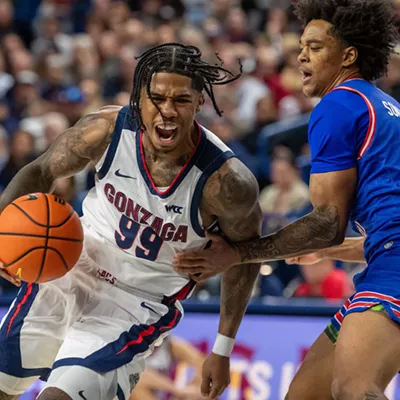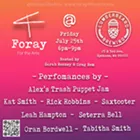Friday, March 5, 2010
Review of *To Kill a Mockingbird* (readers theater version)
continues Monday, March 1, at the South Hill Library, 3324 S. Perry St. and on Wednesday, March 3, at 7:30 pm at the Barnes & Noble just east of the Spokane Valley Mall Free
(See Feb. 18 Inlander, p. 55, and the Calendar of Events)

One of the revelations of a streamlined readers theater version of To Kill a Mockingbird is its emphasis on plot and action: no time for the adult Scout’s narrative voice, ma’am -- or for a few of the characters and several episodes.
All sacrificed for the sake of intro / trial scene / aftermath.
But there were gains, too: Atticus’s appeal is directed right at us, the virtually all-white audience. Scout, Jem, Dill and the Reverend all sat in the “courtroom’s Negro balcony” in the row right in front of me inside Wolff Auditorium inside Gonzaga’s Jepson Hall.
Director Brian Russo had actors entering and exiting through all four available aisles. The impact of being in the room when a white man stands above Tom Robinson, glaring at him and repeatedly calling him “boy.”
The reminder, which you get in performance and not in reading the book, of Tom’s crippled left arm (a crucial plot point, you’ll recall) -- sitting there, stoic and silent.
Well-acted, costumed and blocked. No weaknesses in the cast at all; if I had to pick standouts, I'd select Nate Clemons' marked, younger-version resemblance to Gregory Peck as Atticus, and Kiki Wright's impassioned fear of being humiliated when on the witness stand as Mayella Ewell, the girl who accuses Tom Robinson of rape.
---It was like watching the novel, all sped up, and also more visceral: Bob Ewell (Chris Wheatley, effective as a racist hillbilly, and then, in quite a contrast, remarkably articulate during the post-show discussion) spitting in Atticus' face; Atticus leaning into the faces of witnesses; seeing the final attack and rescue in the light, and not imagining it in some dark field at night; and so on.
Bobo co-led a talkback afterwards (with some interesting audience comments) along with Prof. Vik Gumbhir, who specializes in sociology and criminology and who set forth the details of the Scottsboro Boys case (nine black youths accused of raping white girls in 1931 Alabama -- a notorious case that Harper Lee is clearly alluding to in her novel).
[ photo: Harper Lee in Aug. 2007; from msnbc.com ]
Tags: Gonzaga , Play Review , StageThrust












